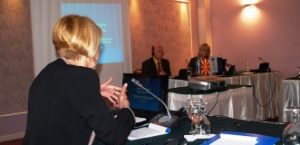 03.06.2014 – Recognizing and dealing with hate speech effectively as well as looking into the legal framework for the interpretation and the regulation of hate speech were the topics explored during the workshop held as part of the Support to Independent Media in Macedonia project.
03.06.2014 – Recognizing and dealing with hate speech effectively as well as looking into the legal framework for the interpretation and the regulation of hate speech were the topics explored during the workshop held as part of the Support to Independent Media in Macedonia project.The media experts Marina Tuneva and Martin Huckerby opened the workshop, and invited journalists and editors to engage in a discussion regarding a very current – the escalation of violent protests and ethnic unrest in the ‘Gorce Petrov’ municipality following the arrest of a young ethnic Albanian boy on suspicion of killing a young Macedonian boy. The discussion raised the question of whether the media should sometimes refrain from divulging information that is likely to cause social unrest – for example the ethnic origins of the victim and accused in the above-mentioned case. The issue of whether the police acted in accordance with standards of professional behavior and if they had prevented journalists from undertaking their constitutionally protected work was also discussed. Subsequently, there was a debate regarding the extent to which the Macedonian government encourages and fuels hate speech.
The general conclusion was that the government should bear the most responsibility for the spread of hate speech, as it very rarely sanctions citizens and the media and in some cases government representatives themselves have resorted to hate speech. The media also plays a huge role as it often unintentionally reinforces or intentionally disseminates hate speech.
The workshop lecture was delivered by the president of Transparency International – Macedonia, Professor Slagjana Taseva, who gave an account of the legal parameters related to the prevention and punishment for the use of hate speech as well as the notion of discrimination.
Professor Taseva provided an extensive description of the international law, the UN and Council of Europe Conventions, and elaborated on Macedonia’s legislation regarding hate speech and protection from discrimination. Professor Taseva emphasized that even though there have been positive changes in the legislation and Macedonia has ratified all major conventions in this regard, their implementation is exceptionally weak.
Professor Taseva explained that in some cases the legislative section relating to sanctions is constrained by very restrictive conditions. The section in the Criminal Code aimed at preventing violation of the honor and reputation of foreign states and their diplomatic representatives in the country was pointed out as an example of this.
Hate speech in Macedonia is often associated with inter-ethnic tensions, but it is increasingly being used as a discriminatory language against minorities and marginalized groups. The workshop participants pointed out that hate speech has recently been directed towards representatives of foreign states or organizations in Macedonia.
Participants concluded that hate speech is a widespread evil in the world and emphasized the fact that the media has a crucial role to play in recognizing and publicly condemning the use of hate speech.



